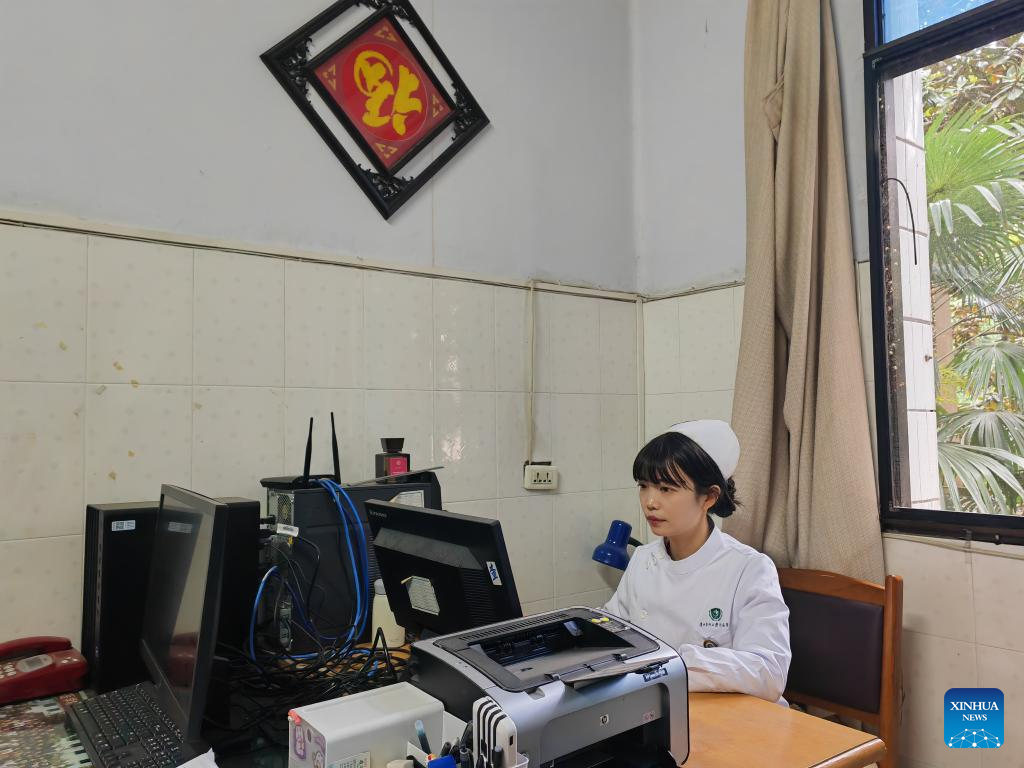Across China: Young Chinese embrace elderly care as calling
Source: Xinhua
Editor: huaxia
2025-05-16 16:11:00

Chen Sheng (L) talks with an elderly man at an elderly care center in Guiyang, southwest China's Guizhou Province, May 9, 2025. (Xinhua/Wu Si)
GUIYANG, May 16 (Xinhua) -- For Chen Sheng, a young man in Meitan County, southwest China's Guizhou Province, caring for the elderly is more than a job -- it's a heartfelt calling rooted in his upbringing with his grandparents.
After graduating in 2017 with a degree in clinical care from Guizhou Vocational College of Industry and Commerce, Chen completed an eight-month internship at the Guizhou Provincial People's Hospital. Thanks to his patience and professionalism, he rotated through eight departments and was named an outstanding intern in seven.
After working as a hospital nurse, Chen shifted to an elderly care center in Guiyang, the provincial capital, in 2018. What he encountered in his early days was far more demanding than expected.
He was required to provide full bedside care -- getting up at 6 a.m. to prepare breakfast, assist with morning routines and tend to the bedridden elderly, including changing diapers. Often, his day didn't end until 11 p.m.
Chen confessed that he wanted to quit in the first three days. But over time, the warmth and trust he received from the elderly changed his mind.
Applying his clinical training, Chen began using skills like repositioning the bedridden elderly in the proper way, performing sputum aspiration, and administering oxygen therapy in his daily work. One notable case involved an 80-year-old man surnamed Li, who arrived at the center with multiple chronic illnesses and complications, fitted with a urinary catheter and gastric tube. After two months of careful care, the octogenarian had his tubes removed and was able to walk again by himself.
"Seeing the elderly recover because of my efforts gives me a deep sense of fulfillment," Chen said.
Beyond medical care, Chen also prioritized emotional support. "The needs of the elderly are never delayed -- they are met the same day," he said.
Chen still remembers an elderly man who chatted with him every day and always shared little things he considered precious. When the man passed away, his family personally thanked Chen for his compassionate care.
More than 300 elders live in the nursing home where Chen works, with an average age of 84. "Many of them remember my name and call me 'Little Chen.' Even some with Alzheimer's still greet me with a smile or a wave," he said with pride.
With seven years of experience under his belt, Chen has steadily advanced in his profession and gained wide recognition. He holds certifications as an intermediate elderly caregiver and a senior elderly ability assessor. He won second prize in a city-level elderly care skills competition in 2021.
Chen noted that as demand for elderly care continues to grow, more young people, including those born after 2000, are entering the sector. Over the past three years, more than a dozen young professionals have joined the elderly care center.
Official statistics showed that as of 2024, China's elderly population -- those aged 60 and above -- has reached approximately 310 million, accounting for 22 percent of the total population. According to projections, by around 2035, this number will exceed 400 million, accounting for more than 30 percent of the total population.
To meet this challenge, China introduced its first comprehensive guideline for elderly care talent development in December 2023. The document outlines broad measures to attract new talent, improve training and establish incentive mechanisms.
Among those joining this growing field is Zhao Xue, a post-90s clinical care postgraduate from Central South University in Hunan Province. Since 2017, she has worked as a nurse at the Affiliated Hospital of Guizhou Medical University.
Zhao focused her postgraduate studies on managing chronic conditions such as diabetes and hypertension, equipping her with the skills to respond to real-world clinical needs.
On one occasion, she recognized signs of a cerebral infarction -- slurred speech and numbness -- while speaking with an elderly patient. Her quick response allowed the medical team to promptly administer life-saving thrombolytic treatment, using medication to dissolve the blood clots.
In January 2024, gerontological nursing was officially designated a sub-discipline of nursing in China.
Zhao now serves as a postgraduate supervisor in the field, incorporating her clinical experience into classroom instruction and organizing ward-based training and case discussions to enhance students' practical skills.
"Elders often suffer from multiple chronic conditions, making clinical care especially demanding," Zhao said. "I hope more young professionals will devote themselves to geriatric nursing and help seniors live out their later years with dignity and comfort." ■

Nurse Zhao Xue works in an office of the Affiliated Hospital of Guizhou Medical University in Guiyang, southwest China's Guizhou Province, May 7, 2025. (Xinhua/Wu Si)



